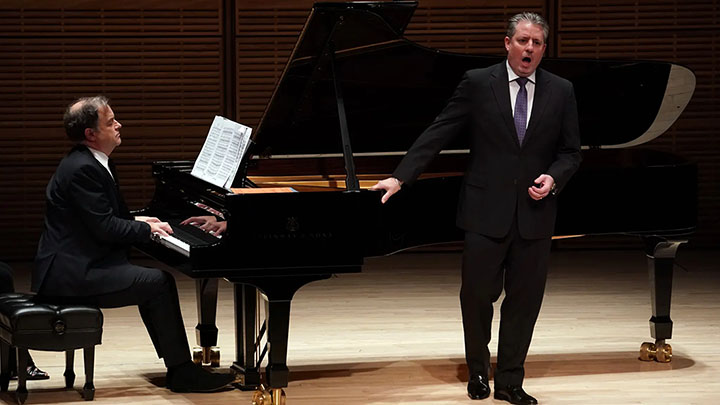
After several variable expeditions into the spinto repertoire at the Metropolitan Opera in recent seasons—which often found him overparted and eclipsed the beauty of tone for which he is justly celebrated—the evening’s program of Lieder and art songs highlighted the unforced elegance and artistry that has made him a mainstay over the past three decades.
At the center of the program, which Polenzani devised with his longtime accompanist Julius Drake, was a relative rarity: a complete performance of Gerald Finzi’s A Young Man’s Exhortation, composed in 1933. The thirty-minute work, comprising ten settings of Thomas Hardy, follows its young speaker as he matures from a callow youth to a stoic elder. His fascination along the way seems to be the fickle nature of women, which could perhaps explain why the cycle has fallen out of favor. Consider these lyrics from the eighth song, uncharitably titled “Former Beauties”:
These market-dames, mid-aged,
With lips thin-drawn,
And tissues sere,
Are they the ones we loved
In years agone,
And courted here?
Are these the muslined pink young
Things to whom
We vowed and swore
In nooks on summer Sundays
By the Froom,
Or Budmouth shore?
Cringe, right? Finzi will certainly not win any feminist prizes, but it stood as a testament to Polenzani’s forthright artistry that he could make a song so riddled with unsavory characterizations sound earnest and sincere. He and Drake shaped the speaker’s experience across the songs as one of personal hardening, where his insensitive depiction of all he observes—mostly women, but nature and society too—came from a growing disillusionment at the shape his life took. The tenor’s vocal colorings throughout these songs complemented the dramatic arc, moving from a bright and sunny youthfulness to a rich and resonant middle age, before settling into a reedy transparency for the final moments, where he accepts death with a peaceful resignation.
Polenzani remained in the English-language realm with a selection of songs by Charles Ives. He impressed with his vocal dexterity in the first half of “Memories a) and b),” keeping pace with Drake’s galloping accompaniment, and with how easily he transitioned to the more romantic sound of the song’s second part. He brought a genuine (but not cloying) sense of childishness to “The Greatest Man” and a pleasant dreaminess to “Feldeinsamkeit.” Other singers might have found a touch more irony in a song like “The World’s Highway,” but Polenzani’s approach lived up to the title of the collection in which it initially appeared: it was a sentimental ballad. His diction stayed sparkling throughout this grouping, and he drew the listener in with the sense that each song was its own monodrama, hurtling forth with a narrative thrust.
German music occupied the remainder of the printed program. Amid a string of dreary days in Philadelphia, drenched by those pesky April showers, it was a treat to be reminded of the promise of spring in Polenzani’s opening selections, “Im Frühling” and “Frühlingsglaube” by Schubert. Although there are dark elements to the texts of each Lied, Polenzani chose not to linger on any negative subtext and instead present these songs as seasonal celebrations. His voice was fresh and open, without a trace of menacing undercurrent. You could occasionally detect some wryness in Drake’s playing, but ultimately, it only served to underscore the earnestness of Polenzani’s choices. As with the Ives, another singer might have performed “Der Einsame” with a sharper edge, but that was simply not Polenzani’s métier.
The tenor brought appropriate intensity to Schumann’s Liederkreis (Op. 24), particularly in the mournful final song, “Mit Myrten und Rosen,” where the richness of his tone reflected a cry of anguish. Elsewhere, he injected these longings for love with a sense of hopefulness that was intriguing and suited his style. As with the entire concert, he approached every piece with a fully fledged concept that made dramaturgical sense, even if it seemed unorthodox. He saved pure beauty for his encores: a rousing “Marechiare” and a lilting interpretation of Reynaldo Hahn’s “La barcheta.”
Polenzani will bring a version of this recital to Park Avenue Armory next month with pianist Ken Noda. I would strongly urge all lovers of song to grab tickets if you can—especially if you’ve been underwhelmed by a recent Cavardossi or Pinkerton. Like Dolly Levi descending the staircase at Harmonia Gardens, Polenzani on a recital stage finds him back where he belongs.
Photo: Michelle V. Agins/The New York Times (2019)


























Comments